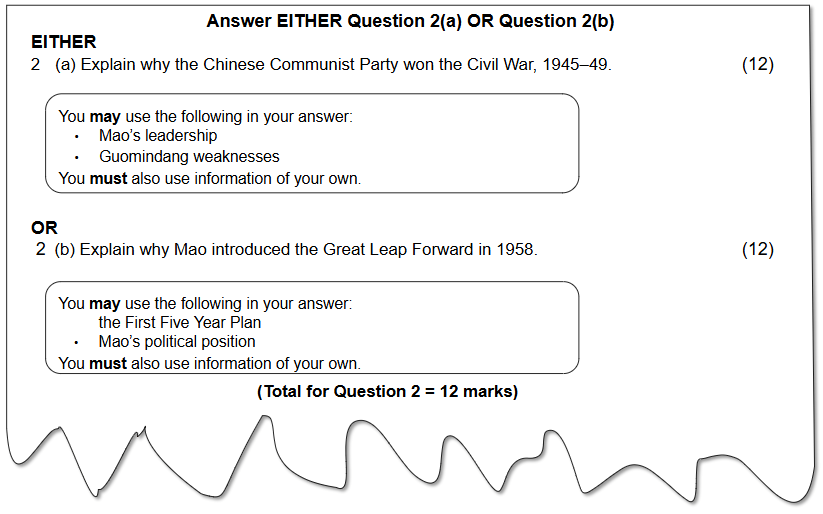The 12 Mark "Explain Why" Question (Edexcel GCSE History): Revision Note
Exam code: 1HI0
Summary of Question 2
Question 2 requires you to provide an analytical explanation of the event, development, theme or factor outlined in the question
This question will require you to use second-order concepts in your answer
This question has changed format since 2024
Previously, you did not have a choice of which 12 mark question you could answer
Now, you have a choice of two questions, in which you will need to answer one
Amount of marks | 12 |
|---|---|
The time that you should spend on the question | No more than 20 minutes 5 minutes of planning 10-15 minutes of writing |
An example of the type of question you may encounter can be seen below:

In previous years, this question has focused on the following topics in Mao's China:
Year of Exam | Question Topic |
|---|---|
2018 | Mao's introduction of the Cultural Revolution (opens in a new tab) |
2019 | The CCP's consolidation of power, 1951–52 (opens in a new tab) |
2020 | The CCP's attack on religion (opens in a new tab) |
2021 | No paper available |
2022 | Mao's dominant position at the start of Communist rule in China (opens in a new tab) |
2023 | Changes in education (opens in a new tab) |
2024 | Why communes experienced problems, 1958–62 |
What are second-order concepts?
Second-order concepts are thinking tools historians use to explain the past
The second-order concepts are:
Cause and consequence
Change and continuity
Similarities and differences
Historical significance
For the example question, the second-order concept is cause and consequence
Question 2 (a) in the example question asks you to explain what caused the CCP to win the Civil War
How to answer an "Explain why" question
This question asks you to explain causes and consequences
You need to demonstrate a clear knowledge and understanding of the events or developments
In the exam, you will be given the option of two questions to answer
You only need to answer one question
You will not receive more marks for responding to both questions
You should put an "X" in the box next to the question you have chosen to answer

You will receive two stimulus points
These are areas of knowledge to discuss in your question
If you only discuss these two stimulus points, you cannot access Level 4 (9-12 marks)
You must discuss three areas of knowledge in your answer to access Level 4
You should always plan your answers before writing them. You should consider:
What three areas of knowledge you are going to use
For Question 2 (b) in the example question, you could include backyard furnaces, the First Five-Year Plan and political challenges from within the CCP
How they demonstrate cause and consequence across the time period outlined in the question
"Explain why" question structure
Your answer should include:
Specific and relevant own knowledge
The second-order concept in the question
A sustained explanation
A logical structure
Your answers could be written in PEEL paragraphs:
P — Make a point about the question
E — Use evidence that supports the point that you have made (K)
Use multiple pieces of evidence from the time period outlined in the question
E — Explain the question (SOC)
Explain how the evidence resulted in the event or development outlined in the question
L — Link your explanation back to the question
To achieve full marks, you need to repeat this structure three times
The question is out of 12 marks:
6 marks for a wide range of specific knowledge of the period and the topic (K)
6 marks for the analysis of the key second-order concepts (SOC)
Worked example of an "Explain why" question
Worked Example
2 (a) Explain why the Chinese Communist Party won the Civil War, 1945–49.
(12)
You may use the following in your answer:
You must also use information of your own. |
Answer:
One reason why the Chinese Communist Party (CCP) won the Civil War was because of Mao’s strong leadership and strategy. Mao made sure that his troops used guerrilla warfare tactics in the early stages of the war, allowing the Communists to avoid direct confrontation when they were weaker than the Guomindang (GMD) (K). Mao's leadership made the Communists seem disciplined and united. This is important because it allowed the CCP to gain support from peasants and win key battles by choosing when and where to fight. Mao also gave clear political direction, showing how the war could be used to continue the Communist revolution. Therefore, Mao’s leadership helped the CCP to stay organised and gradually gain the upper hand (SOC).
Another reason for the CCP’s victory was the weaknesses of the GMD. Although the GMD had more soldiers and American support, it was corrupt and unpopular. Its troops were often forced to fight and were treated badly, which led to low morale (K). This is important because it meant that even with better weapons and resources, the GMD could not maintain control over or win the loyalty of the people. Therefore, the CCP was able to win more support and take over territory, especially in rural areas where the GMD had little control (SOC).
A final reason was that the CCP had much stronger support from the Chinese people, especially the peasants. The Communists promised land reform and equality. In areas they controlled, they took land from landlords and gave it to poor peasants (K). This is significant because it helped them build a loyal base of support in the countryside, which was where most Chinese people lived. It also allowed the Communists to recruit soldiers and gain food and supplies (SOC). Therefore, widespread support made it easier for the CCP to win battles and build a new government after the war.

Unlock more, it's free!
Was this revision note helpful?
